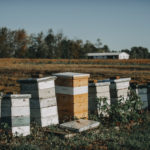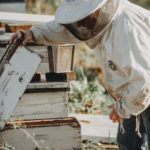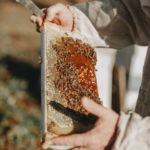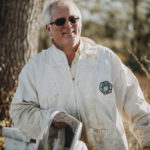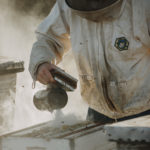New Oxford honey-based business buzzes with success; Penn State Extension Adams County focuses on year-long pollination education
By Karen Hendricks
Photography by Kelsey Kinard
Life is sweet in the Mack family. That’s because Jacki and Hal Mack’s business, Dawg Gone Bees, is based on one vital product—honey.
The shop, located on the New Oxford square, was a beehive of activity recently. Customers were picking up bottled honey and mead, honey-based body lotion, honey butter, honey mustard, and jams and granola made with honey.
“Customers are looking for all-natural products with no preservatives,” Jacki says. “More and more people are giving up granulated sugar and switching to honey, and they appreciate natural moisturizers and beeswax candles, which pull impurities out of the air.”
Beekeeping is a family tradition traced back to the 1870s when Jacki’s great-great-grandfather was a beekeeper in Missouri. The torch passed to Jacki’s grandfather Floyd Wesley, who kept bees in central
New York until the ripe age of 93.
“If there is anybody I want to emulate, it’s him,” says Hal. Jacki’s grandfather took Hal under his wing in the early 1980s. “He was 67, 68 years old, and I asked him when he was retiring. He said, ‘I have retired. I enjoy working with the bees—it’s not hard work, and they teach me something new every day.’”
Beekeepers, Hal has discovered during the past 35 years, learn a lot about bees, their personalities, and honey production by listening and observing their habits over time.
“Bees will fly three miles in any direction to gather nectar,” Hal says. “Our honey is all wildflower, produced from whatever the bees bring in.”
Dawg Gone Bees’ honey is produced by 179 bee colonies buzzing around Adams and York counties. Through relationships with farmers and property owners, Hal’s bees gather nectar and produce honey, pollinating crops at the same time.
“It’s a mutually beneficial relationship,” Hal explains.
The Macks’ launched their business in 2007 when Jacki began selling honey at area farmers’ markets. Over the years, family members caught the buzz. Jacki’s mother developed 25 flavors of honey-sweetened jam, daughter Katherine became a partner in the business, daughter Merissa creates moisturizers and lotions, and son-in-law Nathan makes hand-crafted cutting boards.
Dawg Gone Bees opened its storefront in 2018; the family continues to operate stands at the Markets at Hanover and the seasonal Gettysburg Farmers’ Market on Lincoln Square.
“After 40 years of marriage, we know each other’s strengths, and we have different roles in the business,” says Jacki, who is primarily behind the shop’s counter greeting and helping customers.
Hal recently began educating a new generation of beekeepers by offering beekeeping classes and stocking beekeeping supplies at the shop. He previously worked in the seed industry and as manager of an ag supply store; Jacki dabbled in retail and banking over the years.
Dawg Gone Bees’ products revolve around two annual honey harvests—“a delicate, sweet honey harvest in the spring, and a fall harvest with more of a traditional taste from late summer blossoms like goldenrod, asters, and clover in the open fields,” Hal says.
“It’s the best thing I’ve ever had in my life,” says customer Jen Bacon of New Oxford, who was buying four jars of Autumn’s Ambrosia Honey. “It tastes like caramel—I use it to glaze ham and sweeten tea. It’s natural, it supports local commerce, and bees are important to our existence.”
Dawg Gone Bees
15 Center Square, New Oxford
www.dawggonebees.com
A Hive of Activity: How Bees Produce Honey
Bees produce honey by collecting nectar from flowers and adding enzymes. During their lifetimes, honeybees visit millions of blossoms. While they’re traveling between blossoms to collect nectar, they also brush against pollen and distribute it to other flowers. This is called pollination. Many crops rely on and benefit from this pollination, including apples.
(Source: American Beekeeping Federation)
What is Mead?
Considered the oldest form of alcohol, mead is created by fermenting honey with water.
“Having the right honey and consistency of honey is important for making mead,” says Hal. “Adding fruits and spices gives you variety in flavor.”
Dawg Gone Bees has been offering numerous varieties of mead since 2015 and was recently added to Destination Gettysburg’s Adams County Pour Tour that links breweries, wineries, and other craft beverage makers.
Flower Power
Pollination is the buzzword of the year at the Penn State Extension Adams County, thanks to a 2020 initiative called “Buzz, Blooms, and Beyond.”
“The goal is awareness,” says Mary Ann Ryan, consumer horticulture coordinator. “A lot of people think they can’t do anything to impact pollination, but the bottom line is they can.”
In addition to bees, many other pollinators exist: other insects such as butterflies, mammals (even humans), water, and wind. Basically, anything that moves pollen between plants is a pollinator.
So, why is pollination so important?
“If we don’t have insects to pollinate our plants, our food will be reduced to things that are pollinated by the wind, such as grains and corn. We would have no fruits or vegetables,” Ryan explains. “There are a lot of other reasons pollinators are important—we need insects to feed birds and to continue the food chain. All of these environmental things are impactful.”
Events include three workshops, monthly appearances at the farmers’ market by the Penn State Master Gardeners, plus a program in area elementary schools. Second and third graders will use their imaginations to decorate wooden wings that will “fly” between area businesses and libraries for display. The wings, bearing pollination facts, will also be photo-worthy.
A highlight of the initiative is a festival-type event on Aug. 8; a county-wide garden tour will also be held on that date.
“Everybody can make an impact on pollination,” Ryan says. “Planting trees and native plants … a container of goldenrod on your porch, even if you live in an apartment, can make a difference. What makes Adams County unique is the orchards. That’s why our impact and being more knowledgeable about pollination is important. We have so many people who rely on pollination for their livelihood.”
“Buzz, Blooms, and Beyond” Events
Bees and Blooms Workshop
Saturday, May 2, 10 a.m.–noon
Butterflies and Blooms Workshop
Saturday, July 11, 10 a.m.–noon
Buzz, Blooms, and Beyond Day
Saturday, Aug. 8, 9 a.m.–2 p.m.
Enjoy kids’ activities, garden tours, a butterfly house, and vendors. From 1:30–6:30 p.m., the Very Important Buzz (VIB) Bus Tour will take visitors to area gardens and commercial growers to learn how Adams County supports and depends upon pollinators.
Bugs and Beyond Workshop
Saturday, Sept. 12, 10 a.m.–noon
For more information or to register for the workshops, contact Penn State Extension Adams County at 717-334-6271. All events are held at the Adams County Ag Center, 670 Old Harrisburg Road, Gettysburg.


